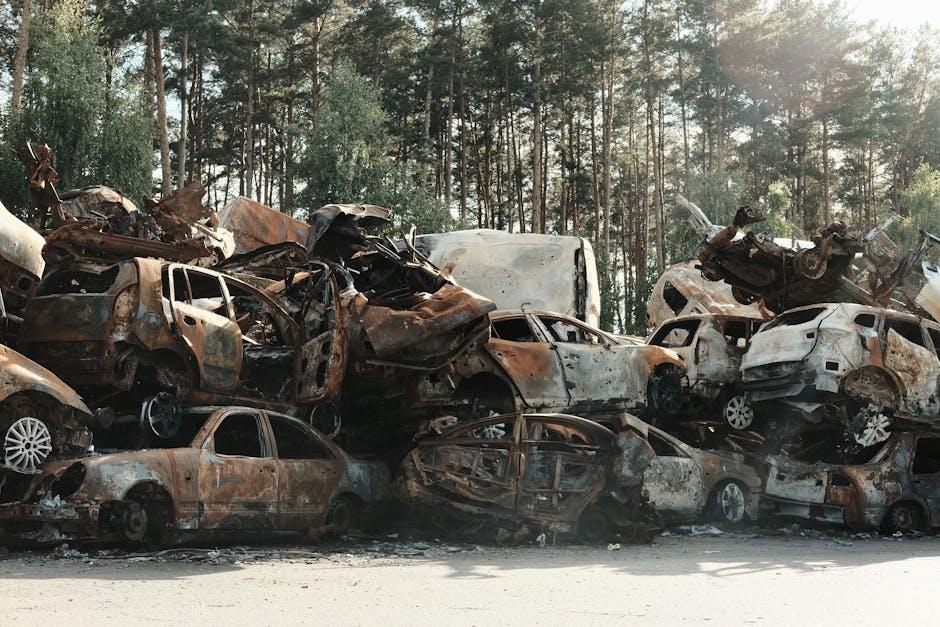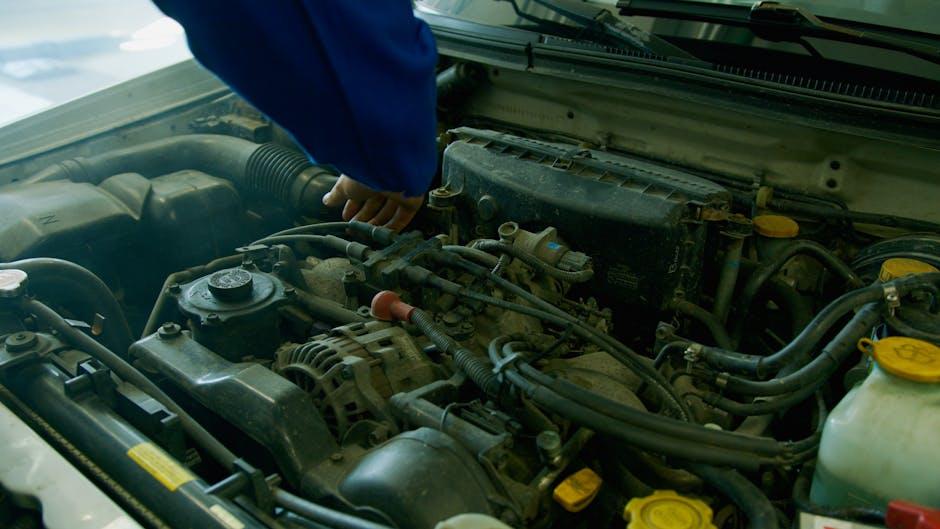Every drop of used motor oil carries the history of your vehicle’s journey—lubricating its parts, cooling its engine, and keeping it running smoothly. But once its job is done, that once-helpful fluid turns hazardous, posing serious risks to our environment and health if disposed of improperly. Knowing how to dispose of used motor oil safely is not just a responsible choice; it’s a vital step in protecting our water, soil, and wildlife from contamination. In this article, we’ll explore practical, eco-friendly methods to ensure your used motor oil finds its second life without leaving a harmful footprint behind.
Table of Contents
- Understanding the Environmental Impact of Improper Motor Oil Disposal
- Preparing Used Motor Oil for Safe Handling and Transport
- Locating Certified Recycling Centers and Collection Programs
- Step-by-Step Guide to Transporting Used Motor Oil Without Spills
- Tips for Storing Used Motor Oil Before Disposal
- Legal Regulations and Community Resources for Motor Oil Recycling
- Q&A
- Insights and Conclusions

Understanding the Environmental Impact of Improper Motor Oil Disposal
Used motor oil is more than just waste—it’s a hazardous substance that poses significant threats to the environment when discarded improperly. Just one gallon of motor oil can contaminate up to one million gallons of fresh water, wreaking havoc on aquatic ecosystems and jeopardizing drinking water supplies. When poured onto soil or down storm drains, the oil seeps into the ground and spreads toxic pollutants, affecting plant life, soil health, and ultimately the animals and humans relying on these natural resources. Unlike many other liquids, motor oil doesn’t biodegrade easily, meaning it lingers in the environment for decades, causing long-term damage.
- Water contamination: Oil creates a film on water surfaces, blocking oxygen transfer which suffocates fish and aquatic organisms.
- Soil degradation: Toxic compounds in oil alter soil composition, reducing fertility and harming microorganisms.
- Wildlife hazards: Animals exposed to oil can suffer from poisoning, reproductive issues, and even death.
| Improper Disposal Method | Environmental Consequence |
|---|---|
| Pouring on ground | Soil contamination, groundwater pollution |
| Dumping down drains | Waterway pollution, aquatic life endangerment |
| Mixing with household waste | Landfill leachate hazards, toxic emissions |

Preparing Used Motor Oil for Safe Handling and Transport
Before transporting used motor oil, it’s crucial to ensure it’s properly contained to prevent spills and environmental contamination. Use sealed, leak-proof containers specifically designed for storing oily liquids, such as heavy-duty plastic jugs or metal drums. Always label the containers clearly with “Used Motor Oil” to avoid any confusion during handling or disposal. Avoid mixing oil with other fluids like antifreeze or solvents, as this can complicate recycling processes and reduce the potential for proper reuse.
When preparing the oil, keep these best practices in mind:
- Drain the oil completely and filter out large debris or contaminants using a fine mesh or oil filter.
- Store containers upright in a cool, shaded place away from direct sunlight or heat sources to prevent pressure buildup.
- Ensure lids are tightly closed to avoid leaks and volatile emissions.
| Step | Action |
|---|---|
| 1 | Use approved containers |
| 2 | Label clearly |
| 3 | Filter debris |
| 4 | Secure lids tightly |
| 5 | Store away from heat |

Locating Certified Recycling Centers and Collection Programs
When it comes to disposing of used motor oil, identifying trustworthy locations is crucial. Many communities offer certified recycling centers and special collection programs designed to handle hazardous materials responsibly. These centers not only protect the environment but often comply with strict regulations that ensure the oil is processed in a safe and sustainable way. To find these facilities, you can start by checking local government websites or environmental agencies that typically list authorized drop-off points.
Additionally, some automotive shops and service stations participate in oil recycling initiatives. To streamline your search, consider these options:
- Use online directories and apps dedicated to hazardous waste disposal.
- Contact your local waste management services for scheduled collection events.
- Look for community bulletin boards or newsletters that announce recycling drives.
| Facility Type | Typical Location | Accepted Oil Volumes |
|---|---|---|
| Certified Recycling Center | Industrial zones, municipalities | Any amount, large quantities preferred |
| Auto Repair Shop | Commercial areas, malls | Small to moderate containers |
| Community Collection Program | Schools, libraries, event centers | Limited volumes during events |

Step-by-Step Guide to Transporting Used Motor Oil Without Spills
Begin by choosing a clean, leak-proof container specifically designed for holding used motor oil. Avoid old milk jugs or food containers, which can dissolve or leak over time. Label your container clearly to prevent accidental spills during transport. Before transferring the oil, gently warm the engine to allow the oil to flow smoothly, but be cautious to avoid burns. Always use a funnel with a long neck or an oil funnel to channel the oil directly into your container, minimizing mess and potential spills.
When it’s time to transport your container, secure it upright in a sturdy box or plastic bin inside your vehicle. This will help prevent tipping and leaks, especially if you’re driving on uneven surfaces. Carry absorbent materials such as old towels or kitty litter in case of unexpected drips. Plan your route ahead to drop off the oil at a certified recycling center or automotive store that accepts used oil. Following these simple yet essential precautions will keep your vehicle and the environment clean and protected from harmful oil spills.

Tips for Storing Used Motor Oil Before Disposal
Before disposal, it is crucial to store used motor oil properly to avoid contamination and ensure safety. First, select a clean, leak-proof container with a tight-fitting lid—preferably made of plastic or metal specifically designed for oil storage. Avoid using containers that previously held food or beverages, as residues can mix with the oil and cause hazardous reactions. Keep the container in a cool, dry place away from direct sunlight and extreme temperatures. This will prevent the oil from degrading or evaporating. Also, always label the container clearly with the words “Used Motor Oil” to avoid confusion and aid recycling centers in proper handling.
To maintain safe storage conditions, follow these simple guidelines:
- Do not mix used motor oil with other fluids like antifreeze, gasoline, or solvents, as this creates hazardous waste.
- Inspect the container regularly for leaks or damage and replace it immediately if any are found.
- Place containers on a sturdy, spill-proof surface, and elevate them if possible to prevent contact with water or ground moisture.
- Store away from ignition sources such as heaters, electrical outlets, or open flames.
| Storage Tip | Reason |
|---|---|
| Use tightly sealed containers | Prevents spills and odors |
| Keep containers upright | Avoid leaks and contamination |
| Store in shaded area | Protects oil integrity |
| Label containers clearly | Ensures proper identification |

Legal Regulations and Community Resources for Motor Oil Recycling
Strict legal requirements govern the disposal of used motor oil to prevent environmental contamination and public health risks. Many countries have enacted laws that mandate proper collection and recycling of automotive oils, with penalties for illegal dumping or improper disposal. Businesses and individuals are often required to store used oil in sealed containers and deliver it to licensed collection centers. These regulations are designed not only to protect natural resources like soil and waterways but also to encourage the adoption of sustainable waste management practices.
Fortunately, numerous community resources make it easy and convenient to recycle used motor oil responsibly. Local auto shops, recycling centers, and municipal hazardous waste programs often accept motor oil free of charge. Some regions even provide drop-off events or mobile collection services. To help residents navigate options, here is a quick overview of typical resources available:
- Automotive service centers – accepted used oil during routine maintenance visits
- Recycling facilities – dedicated centers equipped for oil recycling processes
- Household hazardous waste programs – sporadic drop-off days for various hazardous substances
- Municipal transfer stations – community hubs for multiple waste streams including oil
Q&A
Q&A:
Q1: Why is it important to dispose of used motor oil properly?
A1: Used motor oil contains harmful contaminants that can pollute soil and water if not handled correctly. Improper disposal risks environmental damage and threatens wildlife and human health. Safely disposing of it helps protect our ecosystem and keeps communities clean.
Q2: Can I just pour used motor oil down the drain or on the ground?
A2: Absolutely not. Pouring used motor oil down drains, onto the ground, or into water sources can cause serious pollution. It seeps into waterways, contaminates drinking water, and harms aquatic life. Always avoid these unsafe practices.
Q3: How should I store used motor oil before disposal?
A3: Store your used motor oil in a clean, leak-proof container with a tight-fitting lid—preferably the original container or a sturdy plastic bottle. Keep it away from heat, children, and pets until you’re ready to recycle or dispose of it properly.
Q4: Where can I take used motor oil for recycling or disposal?
A4: Many auto repair shops, service stations, recycling centers, and hazardous waste collection events accept used motor oil. Some communities have designated drop-off points. Check with your local waste management authority to find the nearest safe disposal location.
Q5: Can I recycle used motor oil?
A5: Yes! Used motor oil can be re-refined and reused to make lubricants, fuel oils, and other products. Recycling helps conserve natural resources and reduces environmental impact. It’s a sustainable choice that benefits everyone.
Q6: What about oil filters and oily rags—how do I dispose of those?
A6: Oil filters should be drained and taken to a recycling center or hazardous waste facility. Oily rags can be fire hazards if stored improperly, so place them in a sealed metal container or dispose of them according to local hazardous waste guidelines.
Q7: What if I accidentally spill used motor oil?
A7: Act quickly—contain the spill with absorbent materials like kitty litter or sand. Clean up the area thoroughly, and dispose of the contaminated materials according to hazardous waste protocols. Prompt action reduces environmental harm.
Q8: Is there a fee to dispose of used motor oil?
A8: Some disposal sites charge a small fee, but many accept used motor oil free of charge. It’s best to call ahead and confirm any costs or requirements to avoid surprises.
Q9: How often should I change and dispose of motor oil from my vehicle?
A9: Follow your vehicle manufacturer’s recommendations, which typically suggest oil changes every 3,000 to 7,500 miles. Always collect the used oil in an appropriate container and dispose of it safely after each change.
Q10: Where can I find more information on disposing of used motor oil safely?
A10: Visit your local environmental protection agency’s website, community waste services, or automotive stores. These resources often provide guidelines, locations, and tips to ensure environmentally responsible disposal.
Disposing of used motor oil isn’t just a task—it’s a commitment to protecting the planet. By staying informed and taking the right steps, you become part of a cleaner, safer future for all.
Insights and Conclusions
Properly disposing of used motor oil isn’t just a task—it’s a responsibility we all share to protect our environment and preserve the health of our communities. By taking a few mindful steps to recycle or dispose of oil safely, you become part of a cleaner, greener cycle that keeps our ecosystems thriving. So next time you change your oil, remember: a small action today can prevent a big problem tomorrow. Let’s drive forward with care, ensuring that the oil that once powered our engines doesn’t power pollution in our world.


422 Comments
c0ah0v
c0ah0v
6z42a2
2mv7mv
ef0x4h
j0trql
dw34o3
jkgecq
3jklpf
7872b0
9yt4oa
https://t.me/s/Online_1_xbet/242
https://t.me/rating_online/6
https://t.me/rating_online/8
https://t.me/s/rating_online/13
https://t.me/rating_online/7
https://t.me/Online_1_xbet/3024
xk4qku
https://t.me/Online_1_xbet/2253
https://t.me/Official_1xbet_1xbet/s/1446
https://t.me/Official_1xbet_1xbet/s/131
https://t.me/Official_1xbet_1xbet/s/1344
https://t.me/Official_1xbet_1xbet/s/1104
https://t.me/Official_1xbet_1xbet/s/1338
https://t.me/Official_1xbet_1xbet/s/1530
https://t.me/Official_1xbet_1xbet/s/1236
https://t.me/Official_1xbet_1xbet/s/348
https://t.me/Official_1xbet_1xbet/s/445
https://t.me/Official_1xbet_1xbet/s/1308
https://t.me/Official_1xbet_1xbet/s/884
https://t.me/Official_1xbet_1xbet/s/156
https://t.me/Official_1xbet_1xbet/s/719
https://t.me/Official_1xbet_1xbet/s/142
https://t.me/Official_1xbet_1xbet/s/1462
https://t.me/Official_1xbet_1xbet/s/454
https://t.me/Official_1xbet_1xbet/1794
https://t.me/Official_1xbet_1xbet/1834
https://t.me/Official_1xbet_1xbet/1856
https://t.me/Official_1xbet_1xbet/1768
https://t.me/Official_1xbet_1xbet/1817
https://t.me/s/Official_1xbet_1xbet/1858
https://t.me/s/Official_1xbet_1xbet/1631
https://t.me/Official_1xbet_1xbet/1655
https://t.me/s/Official_1xbet_1xbet/1820
https://t.me/Official_1xbet_1xbet/1672
https://t.me/Official_1xbet_1xbet/1762
https://t.me/s/Official_1xbet_1xbet/1711
https://t.me/s/Official_1xbet_1xbet/1642
https://t.me/Official_1xbet_1xbet/1695
https://t.me/Official_1xbet_1xbet/1626
https://t.me/Official_1xbet_1xbet/1659
https://t.me/s/Official_1xbet_1xbet/1765
https://t.me/s/Official_1xbet_1xbet/1809
https://t.me/Official_1xbet_1xbet/1792
https://t.me/Official_1xbet_1xbet/1743
https://t.me/Official_1xbet_1xbet/1812
https://t.me/Official_1xbet_1xbet/1759
https://t.me/s/Official_1xbet_1xbet/1775
https://t.me/Official_1xbet_1xbet/1718
https://t.me/Official_1xbet_1xbet/1643
https://t.me/s/Official_1xbet_1xbet/1788
https://t.me/s/Official_1xbet_1xbet/1699
https://t.me/s/Official_1xbet_1xbet/1847
https://t.me/s/Official_1xbet_1xbet/1677
https://t.me/Official_1xbet_1xbet/1728
https://t.me/s/Official_1xbet_1xbet/1609
https://t.me/Official_1xbet_1xbet/1611
https://t.me/Official_1xbet_1xbet/1824
https://t.me/Official_1xbet_1xbet/1650
https://t.me/s/Official_1xbet_1xbet/1772
https://t.me/Official_1xbet_1xbet/1786
https://t.me/Official_1xbet_1xbet/1623
https://t.me/s/Official_1xbet_1xbet/1696
https://t.me/s/Official_1xbet_1xbet/1842
https://t.me/Official_1xbet_1xbet/1788
https://t.me/s/Official_1xbet_1xbet/1712
https://t.me/s/Official_1xbet_1xbet/1615
https://t.me/s/Official_1xbet_1xbet/1833
https://t.me/Official_1xbet_1xbet/1669
https://t.me/s/Official_1xbet_1xbet/1830
https://t.me/Official_1xbet_1xbet/1719
https://t.me/Official_1xbet_1xbet/1760
https://t.me/Official_1xbet_1xbet/1754
https://t.me/Official_1xbet_1xbet/1742
https://t.me/s/Official_1xbet_1xbet/1744
https://t.me/s/Official_1xbet_1xbet/1635
https://t.me/Official_1xbet_1xbet/1775
https://t.me/Official_1xbet_1xbet/1756
https://t.me/Official_1xbet_1xbet/1699
https://t.me/s/Official_1xbet_1xbet/1829
https://t.me/s/Official_1xbet_1xbet/1791
https://t.me/s/topslotov
6pv0j8
https://t.me/s/official_1win_aviator
https://t.me/reiting_top10_casino/4
https://t.me/s/reiting_top10_casino/3
https://t.me/s/reiting_top10_casino/5
https://t.me/s/reiting_top10_casino/4
https://t.me/s/reiting_top10_casino/6
https://t.me/s/reiting_top10_casino
https://t.me/reiting_top10_casino
https://t.me/s/reiting_top10_casino/2
https://t.me/reiting_top10_casino/6
https://t.me/reiting_top10_casino/2
https://t.me/reiting_top10_casino/3
https://t.me/s/reiting_top10_casino/9
https://t.me/reiting_top10_casino/5
https://t.me/s/reiting_top10_casino/8
https://t.me/reiting_top10_casino/10
https://t.me/reiting_top10_casino/9
https://t.me/reiting_top10_casino/7
https://t.me/s/reiting_top10_casino/10
https://t.me/s/reiting_top10_casino/7
https://t.me/s/Gaming_1xbet
https://t.me/s/PlayCasino_1win
https://t.me/s/PlayCasino_1win
https://t.me/s/PlayCasino_1xbet
https://t.me/s/PlayCasino_1xbet
https://t.me/s/ofitsialniy_1win/33/evith
https://t.me/s/iw_1xbet
https://t.me/s/ofitsialniy_1win
https://t.me/s/Official_beefcasino
0308eq
https://t.me/s/bs_1xbet/15
https://t.me/s/bs_1xbet/5
https://t.me/bs_1xbet/21
https://t.me/bs_1xbet/3
https://t.me/bs_1xbet/10
https://t.me/bs_1xbet/4
https://t.me/bs_1xbet/18
https://t.me/s/bs_1xbet/32
https://t.me/bs_1xbet/39
https://t.me/bs_1xbet/17
https://t.me/s/bs_1xbet/36
https://t.me/s/bs_1xbet/43
https://t.me/bs_1xbet/11
https://t.me/bs_1xbet/10
https://t.me/bs_1xbet/14
https://t.me/s/bs_1xbet/26
https://t.me/s/bs_1xbet/47
https://t.me/s/bs_1xbet/22
https://t.me/bs_1xbet/41
https://t.me/bs_1xbet/51
https://t.me/bs_1xbet/18
https://t.me/s/bs_1xbet/48
https://t.me/s/bs_1xbet/51
https://t.me/s/bs_1xbet/20
https://t.me/s/bs_1xbet/51
https://t.me/s/bs_1xbet/44
https://t.me/bs_1xbet/14
https://t.me/bs_1xbet/51
https://t.me/bs_1xbet/25
https://t.me/bs_1xbet/45
https://t.me/bs_1xbet/25
https://t.me/bs_1xbet/42
https://t.me/bs_1xbet/19
https://t.me/s/bs_1xbet/17
https://t.me/s/bs_1xbet/50
https://t.me/s/bs_1xbet/48
https://t.me/bs_1xbet/2
https://t.me/bs_1xbet/40
https://t.me/bs_1xbet/8
https://t.me/s/bs_1xbet/5
https://t.me/s/jw_1xbet/189
https://t.me/jw_1xbet/425
https://t.me/jw_1xbet/493
https://t.me/s/jw_1xbet/399
https://t.me/s/jw_1xbet/262
https://t.me/s/bs_1Win/1018
https://t.me/bs_1Win/968
https://t.me/s/bs_1Win/1096
https://t.me/s/bs_1Win/1253
https://t.me/s/bs_1Win/1074
https://t.me/s/bs_1Win/322
https://t.me/bs_1Win/627
https://t.me/bs_1Win/368
https://t.me/bs_1Win/512
https://t.me/bs_1Win/1095
https://t.me/s/bs_1Win/321
https://t.me/s/bs_1Win/458
https://t.me/s/Official_mellstroy_casino/12
https://t.me/Official_mellstroy_casino/57
https://t.me/Official_mellstroy_casino/26
https://t.me/Beefcasino_rus/45
https://t.me/Official_mellstroy_casino/16
https://t.me/s/Official_mellstroy_casino/43
https://t.me/Official_mellstroy_casino/51
https://t.me/Official_mellstroy_casino/50
https://t.me/Official_mellstroy_casino/31
https://t.me/Official_mellstroy_casino/49
https://t.me/s/Official_mellstroy_casino/58
https://t.me/Official_mellstroy_casino/22
https://t.me/Official_mellstroy_casino/37
https://t.me/s/Best_promocode_rus/1799
https://t.me/Best_promocode_rus/1140
https://t.me/s/Beefcasino_rus/57
https://t.me/ud_Kometa/53
https://t.me/s/?ud_1Go/44
https://t.me/s/ud_PlayFortuna/44
https://t.me/s/ud_Gizbo/53
https://t.me/ud_Daddy/64
https://t.me/s/ud_Pinco/54
https://t.me/s/ud_MostBet/51
https://t.me/ud_Vulkan/64
https://t.me/ud_Drip/48
https://t.me/s/ud_Starda/55
https://t.me/s/ud_Jet/50
https://t.me/s/ud_Booi/54
https://t.me/s/ud_MrBit/53
https://t.me/ud_MostBet/63
https://t.me/ud_Drip/62
https://t.me/s/ud_1xbet/52
https://t.me/s/ud_Leon/47
https://t.me/s/Beefcasino_rus/59
https://t.me/ud_Sol/62
https://t.me/s/ud_JoyCasino/58
https://t.me/ud_Fresh/49
https://t.me/ud_Martin/60
https://t.me/s/ud_1xSlots/64
https://t.me/s/ud_Irwin/53
https://t.me/s/ud_Daddy/53
https://t.me/s/ud_Monro/48
https://t.me/ud_MostBet/54
https://t.me/s/ud_Leon/4
https://t.me/s/ud_Jet/18
https://t.me/s/Ud_pIn_up
https://t.me/s/Beefcasino_rus
https://t.me/s/uD_CASinO_X
https://t.me/s/uD_MOSTBEt
https://t.me/s/Ud_KEnT
https://t.me/s/Ud_rIoBet
https://t.me/s/Ud_GiZbo
https://t.me/official_1win_aviator/38
https://t.me/s/UD_jEt
https://t.me/s/uD_1XBET
https://t.me/s/uD_stArda
https://t.me/official_1win_aviator/49
https://t.me/s/Ud_IZZI
https://t.me/s/UD_drIp
https://t.me/s/ud_MarTin
https://t.me/s/UD_pinCo
https://t.me/s/Ud_monRo
https://t.me/s/tf_1win
https://t.me/s/kfo_1win
https://t.me/s/tf_1win
https://t.me/s/kta_1win
https://t.me/official_1win_aviator/50
https://t.me/s/kfo_1win
https://t.me/s/UD_gGbET
https://t.me/s/ud_riObet
https://t.me/s/ud_MOstBeT
https://t.me/s/ud_MRbIt
https://t.me/s/Ud_LEX
https://t.me/s/uD_1xbeT
https://t.me/s/ud_1xSlOtS
https://t.me/s/ud_rox
https://t.me/s/ud_PLAYfortunA
https://t.me/s/Ud_StarDa
https://t.me/s/ud_IRwiN
https://t.me/s/ke_1xbet
https://t.me/s/ke_Stake
https://t.me/s/ke_Monro
https://t.me/s/ke_Izzi
https://t.me/s/official_1win_aviator/260
https://t.me/s/ke_Pokerdom
https://t.me/s/ke_Pinco
https://t.me/s/ke_Jet
https://t.me/s/ke_Gizbo
https://t.me/s/kef_Lex
https://t.me/s/ke_Daddy
https://t.me/s/ke_Volna
https://t.me/s/ke_Sol
https://t.me/s/ke_Casino_X
https://t.me/s/ke_MrBit
https://t.me/s/ke_Martin
https://t.me/s/ke_Irwin
https://t.me/s/ke_Legzo
https://t.me/s/ke_Drip
https://t.me/s/ke_Flagman
https://t.me/s/kef_R7
https://t.me/s/ke_kent
https://t.me/s/ke_MostBet
https://t.me/s/ke_1Win
https://t.me/s/kef_Rox
https://t.me/s/ke_Gama
https://t.me/s/ke_Riobet
https://t.me/s/ke_Kometa
https://t.me/s/ke_Pin_Up
https://t.me/s/official_1win_aviator/554
https://t.me/official_1win_aviator/139
https://t.me/s/ke_Vodka
https://t.me/s/ke_DragonMoney
https://t.me/s/kef_beef
https://t.me/s/ke_1Go
https://t.me/s/ke_Leon
https://t.me/s/ke_Starda
https://t.me/s/official_1win_aviator/553
https://t.me/s/top_kazino_z
https://t.me/s/topcasino_v_rossii
https://t.me/s/a_Top_onlinecasino/15
https://t.me/s/a_Top_onlinecasino/10
https://t.me/a_Top_onlinecasino/10
https://t.me/a_Top_onlinecasino/4
https://t.me/s/a_Top_onlinecasino/13
https://t.me/a_Top_onlinecasino/21
https://t.me/s/a_Top_onlinecasino/7
https://t.me/a_Top_onlinecasino/18
https://t.me/a_Top_onlinecasino/12
https://t.me/s/a_Top_onlinecasino/17
https://t.me/topcasino_rus/
https://t.me/s/official_CatCasino_ed
https://t.me/s/official_Pokerdom_ed
https://t.me/s/official_PinUp_es
https://t.me/s/official_1xSlots_ed
https://t.me/s/official_Sol_es
https://t.me/s/official_Leon_es
https://t.me/s/official_DragonMoney_es
https://t.me/s/official_Irwin_es
https://t.me/s/official_Monro_es
https://t.me/s/official_Rox_ed
https://t.me/s/official_Irwin_ed
https://t.me/s/official_Gizbo_ed
https://t.me/s/official_Martin_es
https://t.me/s/official_PlayFortuna_es
https://t.me/s/official_Jet_es
https://t.me/s/official_Drip_ed
https://t.me/s/official_1Go_es
https://t.me/s/official_Vodka_es
https://t.me/s/official_Volna_ed
https://t.me/s/official_Drip_es
https://t.me/s/official_Starda_ed
https://t.me/s/official_Vulkan_ed
https://t.me/s/official_Legzo_es
https://t.me/s/Starda_egs/8
https://t.me/s/Riobet_egs/7
https://t.me/Kent_egs/11
https://t.me/s/iGaming_live/4617
https://t.me/Stake_egs/12
https://t.me/s/Flagman_egs/17
https://t.me/Starda_egs/8
https://t.me/MostBet_egs/21
https://t.me/s/Starda_egs/9
https://t.me/Flagman_egs/22
https://t.me/s/Riobet_egs/19
https://t.me/Vodka_egs/14
https://t.me/s/JoyCasino_egs/21
https://t.me/s/Leon_egs/17
https://t.me/s/PlayFortuna_egs/18
https://t.me/s/PlayFortuna_egs/7
https://t.me/Rox_egs/22
https://t.me/Irwin_egs/11
https://t.me/Pinco_egs/8
https://t.me/CatCasino_egs/21
https://t.me/Booi_egs/15
https://t.me/Flagman_egs/9
https://t.me/s/?@DragonMoney_egs/20
https://t.me/Volna_egs/11
https://t.me/Flagman_egs/11
https://t.me/s/va_1xbet/18
https://t.me/va_1xbet/9
https://t.me/iGaming_live/4649
https://t.me/s/va_1xbet/22
https://t.me/s/va_1xbet/19
https://t.me/s/va_1xbet/11
https://t.me/va_1xbet/19
https://t.me/va_1xbet/3
https://t.me/s/va_1xbet/4
https://t.me/s/va_1xbet/20
https://t.me/s/va_1xbet/16
https://t.me/s/va_1xbet/3
https://t.me/s/va_1xbet
https://t.me/s/surgut_narashchivaniye_nogtey/4
https://t.me/s/surgut_narashchivaniye_nogtey/10
https://t.me/ah_1xbet/6
https://t.me/ah_1xbet/9
https://t.me/s/ah_1xbet/4
https://t.me/s/ah_1xbet/12
https://t.me/ah_1xbet/5
https://t.me/s/ah_1xbet/2
https://t.me/s/ah_1xbet/16
https://t.me/ah_1xbet/15
https://t.me/s/ah_1xbet/3
https://t.me/s/ah_1xbet/6
https://t.me/ah_1xbet/8
https://t.me/s/Best_rating_casino
https://t.me/reyting_topcazino/13
https://t.me/topcasino_rus/
https://t.me/top_ratingcasino/7
https://t.me/top_ratingcasino/3
https://t.me/a_Topcasino/9
https://t.me/a_Topcasino/10
https://t.me/a_Topcasino/5
https://t.me/top_ratingcasino/10
https://t.me/a_Topcasino/2
https://telegra.ph/Top-kazino-11-14-2
https://t.me/kazino_bez_filtrov
https://t.me/da_1xbet/8
https://t.me/da_1xbet/2
https://t.me/da_1xbet/10
https://t.me/da_1xbet/5
https://t.me/da_1xbet/12
https://t.me/da_1xbet/9
https://t.me/da_1xbet/15
https://t.me/da_1xbet/6
https://t.me/Best_promocode_rus/3598
https://t.me/da_1xbet/11
https://t.me/da_1xbet/4
https://t.me/da_1xbet/13
https://t.me/rq_1xbet/1311
https://t.me/rq_1xbet/1308
https://t.me/rq_1xbet/1517
https://t.me/s/rq_1xbet/1303
https://t.me/s/rq_1xbet/658
https://t.me/s/rq_1xbet/1418
https://t.me/s/rq_1xbet/573
https://t.me/s/Official_1xbet1/447
https://t.me/s/Official_1xbet1/1104
https://t.me/s/Official_1xbet1/702
https://t.me/Official_1xbet1/632
https://t.me/s/Official_1xbet1/901
https://t.me/Official_1xbet1/1007
https://t.me/Official_1xbet1/976